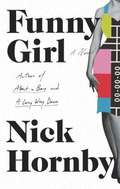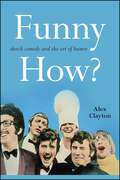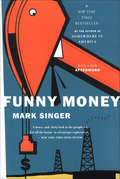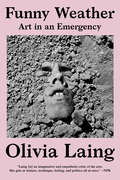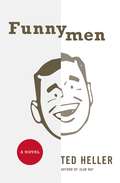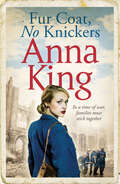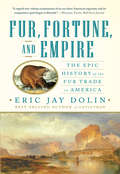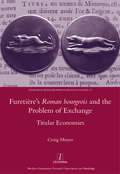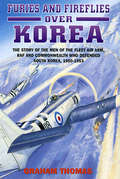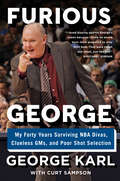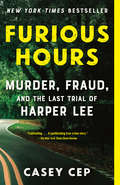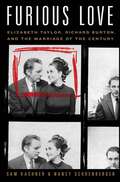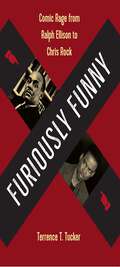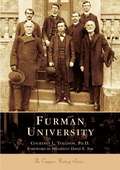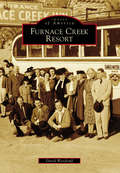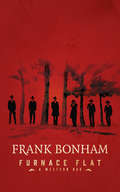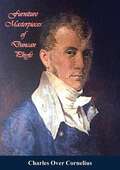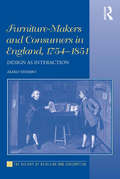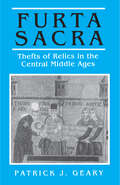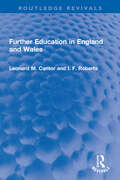- Table View
- List View
Funny Girl: A Novel
by Nick HornbyFrom the bestselling author of High Fidelity, About a Boy, and A Long Way Down comes a highly anticipated new novel. Set in 1960's London, Funny Girl is a lively account of the adventures of the intrepid young Sophie Straw as she navigates her transformation from provincial ingénue to television starlet amid a constellation of delightful characters. Insightful and humorous, Nick Hornby's latest does what he does best: endears us to a cast of characters who are funny if flawed, and forces us to examine ourselves in the process.From the Hardcover edition.
Funny How?: Sketch Comedy and the Art of Humor (SUNY series, Horizons of Cinema)
by Alex ClaytonWhat makes something funny? This book shows how humor can be analyzed without killing the joke. Alex Clayton argues that the brevity of a sketch or skit and its typical rejection of narrative development make it comedy-concentrate, providing a rich field for exploring how humor works. Focusing on a dozen or so skits and scenes, Clayton shows precisely how sketch comedy appeals to the funny bone and engages our philosophical imagination. He suggests that since humor is about persuading an audience to laugh, it can be understood as a form of rhetoric. Through vivid, highly readable analyses of individual sketches, Clayton illustrates that Aristotle's three forms of appeal—logos, the appeal to reason; ethos, the appeal to communality; and pathos, the appeal to emotion—can form the basis for illuminating the inner workings of humor. Drawing on both popular and lesser-known examples from the United States, United Kingdom, and elsewhere—Monty Python's Flying Circus, Key and Peele, Saturday Night Live, Airplane!, and Smack the Pony—Clayton reveals the techniques and resonances of humor.
Funny Money (Picador Bks.)
by Mark SingerNew York Times Bestseller: The “grandly entertaining” true story of an oil boom, an Oklahoma City bank, and a chain of crime, corruption, and collapse (Texas Monthly).The Penn Square Bank, located in an Oklahoma City shopping mall, started raking in money in the late 1970s making high-risk loans in the energy industry—and then selling them to other banks. Then came the summer of 1982, when the whole thing collapsed and took a lot of uninsured depositors down with it, as well as causing major losses at financial institutions coast to coast—and eventually sending an executive to jail.In this book, New Yorker writer Mark Singer recounts the whole spectacular story and makes brilliantly (and hilariously) clear what actually happened and why. Funny Money represents both a unique moment in the history of American banking and a timeless tale of frenzied, reckless greed.“[Singer] tells the tale with wonderful verve. He concentrates not on the financial complexities of the catastrophe but on the colorful people involved.” —The New York Times“Superbly researched and clearly written.” —The Cleveland Plain Dealer“Witty . . . This is a book that refutes anyone operating on the prejudice that business reporting must be dull.” —The Washington Post
Funny Weather: Art In An Emergency
by Olivia Laing“One of the finest writers of the new non-fiction” (Harper’s Bazaar) explores the role of art in the tumultuous twenty-first century. In the age of Trump and Brexit, every crisis is instantly overridden by the next. The turbulent political weather of the twenty- first century generates anxiety and makes it difficult to know how to react. Olivia Laing makes a brilliant, inspiring case for why art matters more than ever, as a force of both resistance and repair. Art, she argues, changes how we see the world. It gives us X-ray vision. It reveals inequalities and offers fertile new ways of living. Funny Weather brings together a career’s worth of Laing’s writing about art and culture, and their role in our political and emotional lives. She profiles Jean-Michel Basquiat and Georgia O’Keeffe, interviews Hilary Mantel and Ali Smith, writes love letters to David Bowie and Wolfgang Tillmans, and explores loneliness and technology, women and alcohol, sex and the body. With characteristic originality and compassion, Funny Weather celebrates art as an antidote to a terrifying political moment.
Funnybooks
by Michael BarrierFunnybooks is the story of the most popular American comic books of the 1940s and 1950s, those published under the Dell label. For a time, "Dell Comics Are Good Comics" was more than a slogan--it was a simple statement of fact. Many of the stories written and drawn by people like Carl Barks (Donald Duck, Uncle Scrooge), John Stanley (Little Lulu), and Walt Kelly (Pogo) repay reading and rereading by educated adults even today, decades after they were published as disposable entertainment for children. Such triumphs were improbable, to say the least, because midcentury comics were so widely dismissed as trash by angry parents, indignant librarians, and even many of the people who published them. It was all but miraculous that a few great cartoonists were able to look past that nearly universal scorn and grasp the artistic potential of their medium. With clarity and enthusiasm, Barrier explains what made the best stories in the Dell comic books so special. He deftly turns a complex and detailed history into an expressive narrative sure to appeal to an audience beyond scholars and historians.
Funnymen
by Ted HellerSIGMUND "ZIGGY" BLISSMAN isn't the best-looking, sanest boy in the world. Far, far from it. But this misfit child of a failed husband-and-wife vaudeville team has one (and only one) thing going for him: He can crack people up merely by batting his eyelashes. And Vittorio "Vic" Fontana, the son of a fisherman, is a fraud. Barely able to carry a tune or even stay awake while attempting to, the indolent baritone (if that's what he is) has one thing going for him: Women love to look at him. On their own, they're failures. But on one summer night in the Catskills, they step onstage and together become the funniest men -- and the hottest act -- in America. Funnymen is the wildly inventive story of Fountain and Bliss, the comedy duo that delighted America in the 1940s and '50s. Conceived as a fictional oral biography and filled with more than seventy memorable characters, Funnymen details the extraordinary careers of two men whose professional success is never matched in their personal lives. The two men fight constantly with their managers, their wives, their children, their mistresses, and those responsible for their success: each other. The stories recounted about Vic and Ziggy -- and the truths Heller reveals about human ambition, egotism, and friendship -- make Funnymen a wild ride of a novel that is also a rare and imaginative masterpiece of storytelling.
Fuoco di Scozia
by Tanya Anne Crosby Valeria D'EllenaScozia, 1125, la Leggenda ha inizio... Per due secoli, il popolo di Aidan dun Scoti ha fatto la guardia al segreto più grande di Scozia, in attesa di un degno successore che posse unire i clan delle Highland. La sua gente è l'ultima dei "Dipinti", i guardiani della vera Pietra del Destino. Una Lotta per il Potere Le tribù delle Highland sono divise. Re David di Scozia cerca un'alleanza con la gente di montagna. Ma solo una donna riuscirà a tentare Aidan dun Scoti - la bellezza maledetta il cui padre una volta ha tradito il suo clan... Tentazione di Vendetta Maledetta dalla gente di Aidan per i peccati commessi da suo padre, Lìleas MacLaren è l'unica donna a cui Aidan si crede immune. Offerta a lui come moglie da David di Scozia in segno di pace, lei è anche la donna che metterà in ginocchio il fiero capoclan.
Fuori le mura
by A L Butcher Diana L WickerQuando arriva la guerra, chi ne sarà colpito? Una breve storia fantasy sulla determinazione di una donna in tempo di guerra.
Fur Coat, No Knickers
by Anna KingA city torn apart by war. A family torn apart by tragedy. A classic World War II saga from the author of Palace of Tears. At the top of Lester Road in London&’s East End stands &“Paddy&’s Castle,&” the three-story, red-bricked Georgian house that is home to Grace Donnelly and her family. Life may be hard in the late 1930s, but it is nothing compared with what is about to follow. Grace&’s beloved fiancé Stanley decides to enlist in the fight against Nazi Germany. And as the sirens signal blitz after blitz of bombers, the family can only hide in the cellar and hope they will survive. But Grace has more than just the Germans to worry about. The good-looking Nobby Clark is keen to do more than just look out for his best friend&’s fiancée. And scheming barmaid Beryl Lovesett is determined to worm her way into the family home, seducing Grace&’s uncle with her fur coat, no knickers . . . &“A gripping wartime novel, with strong female characters . . . Full of courage, hope, and heartbreak.&” —Alina&’s Reading Corner
Fur, Feathers, and Claws
by David ConnorThree young men from very different homes, just coming into their own sexuality, bond at a time when information about homosexuality is scarce to the average teen. Their strong connection cannot survive high school and heartache, however, and their triangle collapses under the weight of prejudice and a need to escape.Ten years later, Tucker is bitter and hurt by all the tragedy in his life since those long ago happier days. Reclusive, somewhat animalistic, and completely content to stay that way, he’s brought up short by an unexpected confrontation with the past and feelings that won't stay buried.
Fur, Fortune, and Empire: The Epic History of the Fur Trade in America
by Eric Jay DolinA Seattle Times selection for one of Best Non-Fiction Books of 2010 Winner of the New England Historial Association's 2010 James P. Hanlan Award Winner of the Outdoor Writers Association of America 2011 Excellence in Craft Award, Book Division, First Place "A compelling and well-annotated tale of greed, slaughter and geopolitics." --Los Angeles Times As Henry Hudson sailed up the broad river that would one day bear his name, he grew concerned that his Dutch patrons would be disappointed in his failure to find the fabled route to the Orient. What became immediately apparent, however, from the Indians clad in deer skins and "good furs" was that Hudson had discovered something just as tantalizing. The news of Hudson's 1609 voyage to America ignited a fierce competition to lay claim to this uncharted continent, teeming with untapped natural resources. The result was the creation of an American fur trade, which fostered economic rivalries and fueled wars among the European powers, and later between the United States and Great Britain, as North America became a battleground for colonization and imperial aspirations. In Fur, Fortune, and Empire, best-selling author Eric Jay Dolin chronicles the rise and fall of the fur trade of old, when the rallying cry was "get the furs while they last." Beavers, sea otters, and buffalos were slaughtered, used for their precious pelts that were tailored into extravagant hats, coats, and sleigh blankets. To read Fur, Fortune, and Empire then is to understand how North America was explored, exploited, and settled, while its native Indians were alternately enriched and exploited by the trade. As Dolin demonstrates, fur, both an economic elixir and an agent of destruction, became inextricably linked to many key events in American history, including the French and Indian War, the American Revolution, and the War of 1812, as well as to the relentless pull of Manifest Destiny and the opening of the West. This work provides an international cast beyond the scope of any Hollywood epic, including Thomas Morton, the rabble-rouser who infuriated the Pilgrims by trading guns with the Indians; British explorer Captain James Cook, whose discovery in the Pacific Northwest helped launch America's China trade; Thomas Jefferson who dreamed of expanding the fur trade beyond the Mississippi; America's first multimillionaire John Jacob Astor, who built a fortune on a foundation of fur; and intrepid mountain men such as Kit Carson and Jedediah Smith, who sliced their way through an awe inspiring and unforgiving landscape, leaving behind a mythic legacy still resonates today. Concluding with the virtual extinction of the buffalo in the late 1800s, Fur, Fortune, and Empire is an epic history that brings to vivid life three hundred years of the American experience, conclusively demonstrating that the fur trade played a seminal role in creating the nation we are today.
Furetiere's Roman Bourgeois and the Problem of Exchange: Titular Economies
by Craig Moyes"'If Furetiere (1619-1688) hadn't been friends with Racine and Boileau, if he hadn't been famous for his Dictionary and for his battle with the Academie Francaise, it is unlikely that we would still be speaking of the Roman bourgeois (1666). Its qualities are decidedly few. One cannot even say in its favour that it bears witness to a period and a moment in our literary history.' So writes Antoine Adam in his magisterial history of 17th-century French literature. But whatever one might feel about the aesthetic value of the Roman bourgeois - and following Adam it is usually classified as a precocious though failed example of narrative realism, sadly out of step with the classicism of its time - can we really say that it bears no witness to its period? Craig Moyes shows on the contrary how, within the disarticulated narrative of the Roman bourgeois, Furetiere - the titular abbot, the sitting academician, the secret lexicographer, the experimental novelist - was uniquely placed to explore a changing literary economy marked most spectacularly by the trial of Nicolas Fouquet (1661-1664), the decline of aristocratic largesse, and the subsequent centralization of artistic patronage around the personal reign of Louis XIV and the new administration of Colbert."
Furies and Fireflies over Korea: The Story of the Men of the Fleet Air Arm, RAF and Commonwealth Who Defended South Korea, 1950–1953
by Graham A. ThomasThe historian and author details the exploits of British and Australian pilots during the Korean War. With the outbreak of the Korean War, the UN Security Council called on its members to act and 16 nations did, with Britain sending aircraft carriers such as HMS Truimph, from which piston-engined Sea Fury fighters and Fairey Firefly fighter-bombers operated. This is the story of the British and Australian Fleet Air Arm pilots and their missions over hostile territory, missions carried out with distinction and honor.
Furious George: My Forty Years Surviving NBA Divas, Clueless GMs, and Poor Shot Selection
by Curt Sampson George KarlThe firebrand former NBA coach and player recounts his career in this candid memoir.During his three-decade career as a head coach in the NBA, George Karl has amassed more victories (1,175) than all but four men in league history, including Phil Jackson. While Jackson may have earned his iconic status by morphing into the Zen master, Karl has succeeded in the opposite manner—as an excitable firebrand who never backed down from a confrontation on or off the court.In telling his story, Karl holds nothing back, talking candidly about the greed, selfishness, and ass covering he believes are characteristic of many modern professional players.Off the court, Karl has summoned that inner steel to battle cancer alongside his son, Coby. Their shared struggle to overcome the toughest of all opponents shows a rarely-glimpsed side of Karl—a warmer, more compassionate streak that values family above all else.Raw, hard-hitting, and brutally honest, Furious George is as in-your-face and entertaining as the game that has defined Karl’s life. Whether in backwater semi-pro towns or in NBA cities, George Karl coaches one way—all out.
Furious Hours: Murder, Fraud, and the Last Trial of Harper Lee
by Casey CepAs seen on CBS Sunday Morning In Furious Hours, Casey Cep unravels the mystery surrounding Harper Lee's first and only work of nonfiction, and the shocking true crimes at the center of it. Reverend Willie Maxwell was a rural preacher accused of murdering five of his family members for insurance money in the 1970s. With the help of a savvy lawyer, he escaped justice for years until a relative shot him dead at the funeral of his last victim. Despite hundreds of witnesses, Maxwell's murderer was acquitted--thanks to the same attorney who had previously defended the Reverend. Sitting in the audience during the vigilante's trial was Harper Lee, who had traveled from New York City to her native Alabama with the idea of writing her own In Cold Blood, the true-crime classic she had helped her friend Truman Capote research seventeen years earlier. Lee spent a year in town reporting, and many more years working on her own version of the case. Now Casey Cep brings this story to life, from the shocking murders to the courtroom drama to the racial politics of the Deep South. At the same time, she offers a deeply moving portrait of one of the country's most beloved writers and her struggle with fame, success, and the mystery of artistic creativity. A New York Times Bestseller.
Furious Love: Elizabeth Taylor, Richard Burton, and the Marriage of the Century
by Sam Kashner Nancy SchoenbergerFrom veteran entertainment reporter Sam Kashner and biographer Nancy Schoenberger comes the definitive account of the greatest Hollywood love story ever told—the romance of Elizabeth Taylor and Richard Burton. Kashner has interviewed Elizabeth Taylor numerous times and is the only journalist given access to her extensive collection of personal letters and journals, and he and Schoenberger have also interviewed the Burton family at length, including Burton’s actress daughter Kate. This is truly an authorized and singularly informed biography of these two larger-than-life stars, and of their glamorous, volatile, and audacious relationship.
Furiously Funny: Comic Rage from Ralph Ellison to Chris Rock
by Terrence T. Tucker"An important and timely expansion of American racial discourse. Tucker’s demonstration of how the comic is not (just) funny and how rage is not (just) destructive is a welcome reminder that willful injustice merits irreverent scorn. "—Derek C. Maus, coeditor of Post-Soul Satire: Black Identity after Civil Rights "Adroitly explores how comic rage is a skillfully crafted, multifaceted critique of white supremacy and a soaring articulation of African American humanity and possibility. Sparkling and highly readable scholarship."—Keith Gilyard, author of John Oliver Killens: A Life of Black Literary Activism A combustible mix of fury and radicalism, pathos and pain, wit and love—Terrence Tucker calls it "comic rage," and he shows how it has been used by African American artists to aggressively critique America’s racial divide. In Furiously Funny, Tucker finds that comic rage developed from black oral tradition and first shows up in literature by George Schuyler and Ralph Ellison shortly after World War II. He examines its role in novels and plays, following the growth of the expression into comics and stand-up comedy and film, where Richard Pryor, Spike Lee, Whoopi Goldberg, and Chris Rock have all used the technique. Their work, Tucker argues, shares a comic vision that centralizes the African American experience and realigns racial discourse through an unequivocal frustration at white perceptions of blackness. They perpetuate images of black culture that run the risk of confirming stereotypes as a means to ridicule whites for allowing those destructive depictions to reinforce racist hierarchies. At the center of comic rage, then, is a full-throated embrace of African American folk life and cultural traditions that have emerged in defiance of white hegemony’s attempts to devalue, exploit, or distort those traditions. The simultaneous expression of comedy and militancy enables artists to reject the mainstream perspective by confronting white audiences with America’s legacy of racial oppression. Tucker shows how this important art form continues to expand in new ways in the twenty-first century and how it acts as a form of resistance where audiences can engage in subjects that are otherwise taboo.
Furman University (The Campus History Series)
by Courtney L. TollisonFounded in 1826 by a group of South Carolina Baptist Convention leaders, Furman Academy and Theological Institution was named after Richard Furman, the first president of the first national gathering of Baptists in the United States. Furman currently resides several miles north of Greenville, as it has since the 1950s, though it has changed locations and names several times since its founding and disaffiliated from the Baptist Convention in 1992. Well known for its beautiful campus, impressive academics, and successful alums, Furman is one of the top 50 liberal arts colleges in the country and was ranked fourth in the country in U.S. News and World Report's "Undergraduate Research" category.
Furnace Creek Resort: A History Of Furnace Creek Resort And Its Evolution Into The Oasis Of Death Valley (Images of America)
by David WoodruffSince opening on February 1, 1927, with just 12 guest rooms, Furnace Creek Resort has achieved preeminence among US National Park lodges and hotels. Conceived by the Pacific Coast Borax Company in 1926, the inn was the answer to the declining mining industry, which had left the Death Valley Railroad with nothing to haul. The construction of Furnace Creek Inn helped to shift Death Valley's draw from mining to tourism, bringing a new industry to the Old West. Steeped in history and tradition, the inn and the ranch have become as much a destination as the park itself. With naturally heated swimming pools, the world's lowest golf course, four-diamond hospitality, and surroundings of unsurpassed natural beauty, Furnace Creek offers experiences that are long remembered by its guests.
Furnace Flat: A Western Duo
by Frank Bonham Traber Burns“Sergeant Forson’s Dirty-Shirt Army” is set in eastern Oregon, at a forgotten outpost left behind by the regular Army during the War between the States. Fort Haney is now home to a troop of fifty-seven men, raw recruits in the Oregon Volunteer Cavalry, who care little about fighting except among themselves, in spite of the fact that they are surrounded by hostile Snake and Cayuse Indians, just waiting for opportune moments to strike at farmers, ranchers, and stagecoaches. Their commanding officer plots strategy by retiring to his quarters, building model ships, and drinking whiskey. What alone can make a difference perhaps is Sergeant Ward Forson, previously trained in the regular Army. When word comes that the daughter of the commanding officer is on her way by stagecoach, coming to Fort Haney, both Major King and Sergeant Forson know that an Indian attack is likely. It is up to Forson to insure that these undisciplined recruits, who have been living almost like animals, will now pull together and meet their adversaries like true soldiers.“Furnace Flat” is set in Death Valley. For twelve years now, Grady Ryan has worked in Borax mines, always with the idea to get a stake and strike off on his own to find a rich lode. He has done this several times in the past, but this time he has reason to expect to find a true bonanza. He is partnered with the elderly Mysterious Smith. Ryan is certain that Smith knows the location of a fabulous lode. And Ryan is right. But Smith knows they will be followed into the desert by ruthless claim-jumpers. His reason for wanting Ryan along is to fight off the claim-jumpers, not to share in a fortune with him. Maggie Conway, who operates a successful hash house in Furnace Flat, from which Grady and Smith are set to depart, is highly intuitive, and she tells Ryan that she is as sure as she has ever been that this time he will make his strike and find success at last. Intuitive she may be, but no fortune-teller.
Furnishing Fascism: Modernist Design and Politics in Italy
by Ignacio G. GalánThe role of modernist interior design in the construction of Italian nationalism Along with the rise of Mussolini&’s fascist regime, the interwar years in Italy also saw the widespread development of its modernist interior design and furnishing practices. While the regime&’s politics were overtly manifest in monumental government architecture, Furnishing Fascism examines the subtler yet effective role of household goods and decor in the cultivation of Italy&’s exclusionary sense of national identity. Presenting a fresh look at the work of various architects and designers, including iconic figures such as Gio Ponti and Carlo Enrico Rava, Ignacio G. Galán explores how seemingly neutral products of everyday life contributed to the propagation of fascist ideology. Through extensive promotion in popular magazines and department stores, on the film sets of Cinecittà Studios, and throughout the country&’s colonial territories, Italy&’s modernist design practices were part of a larger political project that aimed to produce a totalizing image of cultural hegemony. Interweaving design theory, architectural history, and media scholarship, Furnishing Fascism reexamines the period&’s so-called minor arts to reveal the political entanglement of modernism in early twentieth-century Italy and offers valuable insight into the complications of cultural production under the auspices of authoritarian power. Retail e-book files for this title are screen-reader friendly with images accompanied by short alt text and/or extended descriptions.
Furniture Masterpieces of Duncan Phyfe [Illustrated Edition]
by Charles Over CorneliusThis well-known reference work has been consulted by generations of collectors, curators, dealers, historians, and craftsmen, and it remains in use decades after its initial publication. Photographs and measured drawings of the most striking furniture pieces of the sixteenth through nineteenth centuries constitute the major part of the book; the accompanying text indicates stylistic features and developments, prototypes, types of wood, function, and location of the original. Selected mainly from collections in the Metropolitan Museum of Art, Boston Museum of Fine Arts, and the Museum of the Rhode Island School of Design, the objects include chests, tables, chairs, dressing tables, desks, highboys, commodes, couches, and other furniture. Periods and styles include Colonial American, Duncan Phyfe, Windsor, Sheraton, Hepplewhite, Chippendale, Louis XIV, eighteenth-century Dutch, sixteenth-century Italian, and representatives of other eras. The book's most outstanding features are the measured drawings for each piece of furniture. Accurate to the nearest 1/16th of an inch, these drawings are especially valuable for woodworkers creating detailed replicas.-Print ed.
Furniture-Makers and Consumers in England, 1754–1851: Design as Interaction (The History of Retailing and Consumption)
by Akiko ShimboCovering the period from the publication of Thomas Chippendale's The Gentleman and Cabinet-Makers' Director (1754) to the Great Exhibition (1851), this book analyses the relationships between producer retailers and consumers of furniture and interior design, and explores what effect dialogues surrounding these transactions had on the standardisation of furniture production during this period. This was an era, before mass production, when domestic furniture was made both to order and from standard patterns and negotiations between producers and consumers formed a crucial part of the design and production process. This study narrows in on three main areas of this process: the role of pattern books and their readers; the construction of taste and style through negotiation; and daily interactions through showrooms and other services, to reveal the complexities of English material culture in a period of industrialisation.
Furta Sacra: Thefts of Relics in the Central Middle Ages - Revised Edition
by Patrick J. GearyTo obtain sacred relics, medieval monks plundered tombs, avaricious merchants raided churches, and relic-mongers scoured the Roman catacombs. In a revised edition of Furta Sacra, Patrick Geary considers the social and cultural context for these acts, asking how the relics were perceived and why the thefts met with the approval of medieval Christians.
Further Education in England and Wales (Routledge Revivals)
by Leonard M. Cantor I. F. RobertsFirst published in 1972, this second edition of Further Education in England and Wales was written to provide a comprehensive account of the character and extent of further education in England and Wales. The book critically analyses the major features of further education at the time of publication, and suggests ways in which it might profitably develop in the years ahead. It provides an important account of the post-war historical background to further education, and examines in detail topics such as the role of polytechnics and the work of the Council for National Academic Awards; the educational implications of the Industrial Training Act; developments in education for business and management; and, the changing pattern of education for art and design. The book also considers the training of teachers for further education, and further education in Wales.
